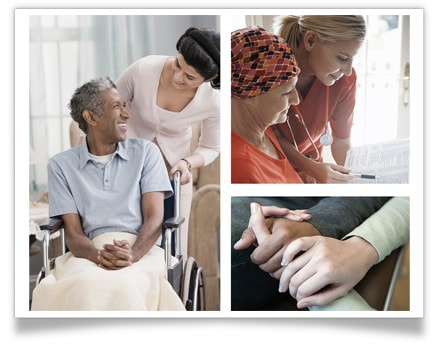Hospice Keystone House Hospice Team A Simple Wish F.A.Q.
Hospice Care Team
The Hospice Care Team consists of the doctors, nurses, home health aides, social workers, chaplains, volunteers, creative arts therapists, and bereavement specialists. The team works together to manage symptoms and meet emotional, spiritual, and medical needs of our patients and families. The team members are all trained, experienced, and credentialed professionals in their respective specialty areas.
Hospice Medical Director
Our medical doctors, specializing in the care of patients at the end of their lives, advise Keystone Care’s highly trained staff, and provide overview of patient care and guidance on a 24-hour basis. Our Hospice Medical Directors are certified by the American Board of Hospice and Palliative Care.
REGISTERED NURSE
Hospice nurses make visits to patients’ homes, providing skilled nursing care. The frequency of these visits is determined by the patient, family, and nurse. The hospice nurse is specially trained in symptom management, which includes pain management. The nurse keeps in touch with the primary care physician when a patient’s condition changes and/or if medication changes are needed. The nurse is responsible for ordering medicine and guides the patient and family through stages of the disease.
CERTIFIED NURSING ASSISTANT, HOME HEALTH AIDES, AND HOMEMAKERS
This team is specially trained to provide personal care to patients such as skin care, bathing, shampooing, shaving, or any personal grooming needs, as well as food preparation or light housekeeping.
Emotional and Psychological Support
The hospice social worker is a professionally trained individual who is involved with the patient and family to provide counseling, and offer information on community resources. After admission to the hospice program of care, an in-depth assessment of the patient and family is conducted. Periodic visits and phone calls are made to offer support and address any patient or family concerns.
Spiritual Care
KeystoneCare’s hospice interfaith chaplain provides support to patients and families for spiritual support. The chaplain is trained to support any religious preference and coordinates with local clergy when that is the patient’s preference.
Bereavement Counselors
Bereavement services are offered as part of hospice care, for at least one year following the death of a loved one. Staff and volunteers provide support at the time of death, offer visits or calls following the death, and periodic contact as needed. Grieving is highly personal and a unique experience for every individual, and KeystoneCare is here to provide bereavement support to individuals and families. There is no “right or wrong way” to grieve. There are, however, healthy ways to cope or manage the pain of losing a loved one. Grief that is experienced and expressed has greater potential for healing, and over time, can strengthen and enrich life.
HEALING IS POSSIBLE
KeystoneCare is dedicated to offering specialized support for anyone who is grieving the loss of a loved one, through groups and workshops. Our Bereavement Programs are offered to families and the members of the community, free of charge.
Pre-registration for groups and workshops is required.
Trained Volunteers
Our trained volunteers are dedicated to serving you, your loved one, and your family. They are an integral part of the Hospice Care Team. Volunteers are trained and skilled in active listening, and are sensitive to the needs of patient, caregiver, and families. Volunteers provide respite for the caregiver by visiting weekly at a prearranged time to suit the caregiver’s schedule, giving the caregiver the opportunity for that essential respite time. Shopping, walking in fresh air or lunch with friends; caregivers may enjoy a break with the comfort of knowing the patient is in the care and company of a warm-hearted and specially trained Keystone Hospice volunteer. Volunteers are just a phone call away, offering:
- Companionship
- Caregiver respite
- Reading to the patient
- Discussing a book, music or TV program
- Sharing the joys of listening to music or singing
- Writing letters
- Playing a game
- Assisting at mealtime
Save
Save
Save
Save
Save